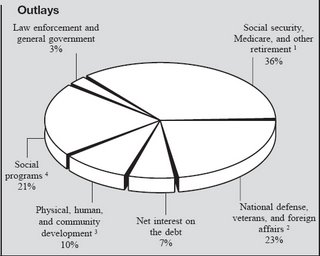I’m often surprised when people remark that they are not part of the community, or that by doing what they do, i.e. their job doesn't help anyone. I think the problem is that our society makes it difficult to see how what we do has a positive impact; and that the reason for this, in turn is that people have become more specialized in what they do.
Consider taxes. Nobody really likes them, but take a look at what they do:
 A whopping 80% of taxes go directly towards helping people – social security, etc. or towards national defense.
A whopping 80% of taxes go directly towards helping people – social security, etc. or towards national defense.
Suppose you give 10% of your income to taxes. This is like spending 4 hours a week performing community service – helping elderly people with medical conditions, teaching children, defending the nation, etc.
The thing is, it's a lot more efficient to have one person concentrate on teaching kids all the time than to have 10 people who only teach for 4 hours a week. Hence teachers. It makes much more sense to have one person learn about caring for sick people than to have 10 people doing it part time. Hence doctors.
People in our society become ever more efficient and good at what they do: a high-school teacher vs. a college professor. They both have the same basic job, but they specialize on different aspects student ages and topics.
For this to work, however, everyone else has to become more specialized as well. People don't just answer phones; there are the ones who deal with car insurance vs. support for computers. You have people who specialize in building engines for cars vs. engines for bulldozers.
At each level of efficiency comes more specialization. At each level of specialization, comes more isolation. The world of the person that answers phones is far different from the person that grows food. The person that teaches kindergarten is very different from the person that designs computers. There is less common ground.
Because there is very fast transportation, more time is spent at the job or getting to and from the job, then interacting with each other. 8 hours on the job plus 1 or more hours getting to and from, plus 1-2 hours spent eating meals, preparing for work or winding down afterwards. 30 to 60 minutes exercising (if you have an iron will). This leaves about 5 hours a day to socialize with those around us.
But efficiency steals some of that too. When we go to get food, you don't always see the same people, because it's better to make large distribution centers than small ones – supermarkets. You are in a car isolated from others getting there and back. Same thing for getting clothes, etc.
While isolation can be a problem, its solution can be a goal to strive for. Should we abandon fast transportation, or perhaps try creating more "after work" opportunities? Is the best approach to spend more time talking with our neighbors, or are online chat rooms the way to go?
I don't know what the solution to this problem is, but one thing I do know is that, given the abilities and resources we have, if it can be solved, our community is the one that can solve it.
Tags: community, society, isolation.
Authors note: this was my third attempt at this article, and every time I tried to simply edit what I had already written, I got a different result. In the face of continuing frustration, and that I hadn't posted anything in a couple of days, I decided that posting something was preferable to nothing.
-W




3 comments:
o.k. after some technical difficulties, I finally got your blog up on my list.
<undying-gratitude>
Yipeeee! Thanks muchly!!
</undying-gratitude>
We are part of the blogging community, does that count?
Post a Comment